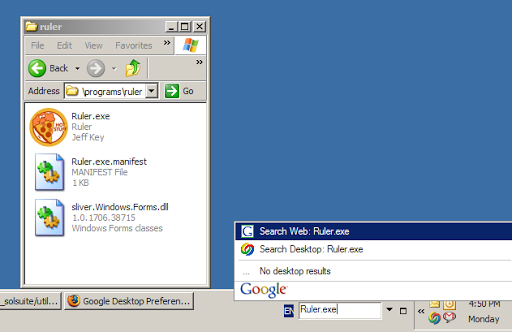All right, I want to jot down a few comments about DemoCampOttawa9 before I go off to bed. Now, I'm a software developer. I'm not a startup entrepreneur, nor an investor, nor someone in any way qualified to comment about how insanely great or ridiculously and laughably stupid a business idea is, so I'll just stick to talking a tiny bit about what I saw tonight. Oh yeah, the pics are up on flickr right here if you're interested, the license is Creative-Commons, and sorry about the wacky colours, it was your typical low-light restaurant / bar room.
DemoCampOttawa is a semi-regular series of meetings where members of the Ottawa high-tech community can go up on stage and show off hardware, software, services they're working on. 
First, a big congrats to Alec Saunders for being a smooth and lively host. A nice thing about this evening is that no one that presented was a slick, practiced, PR person - every single presenter was a techy, and that made for an accessible, informal feel.
First up was a presenter from SIMtone. From the demo, they basically seem to rent you a WinXP virtual machine running in a datacenter. You don't just connect over RDP however, they provide a light Java client that runs on very modest hardware that can give you access to your VM instance. The presenter didn't have time to explain how they balanced the hosted VMs across physical boxes, or how much CPU and bandwidth you're allowed to use, etc, but he was accessing it over WiMax and it seemed to work OK. [note: we have WiMax service in Ottawa???]

We got an engineer who implemented a GPU on a Xilinx FPGA. He had it running live on a demo board, but didn't go into much detail about whether he was generating the video signal himself too or if he had much extra hardware on there to do that, etc.
This is Richard Mayer from Protecode. He demo'ed an interesting Eclipse plugin and associated web service that fingerprints external code added to your development projects and tracks the licenses under which it's distributed. It seems the big value here is in the massive database of publicly-distributed code they've built up. Their software can identify not only third-party libraries and source files added to a project, but small chunks of code pasted in as well.
Martin demoing Stockify, a web app for evaluating value stocks. The app looks at historical P/E ratios and earnings growth of public companies.
And finally, Joel and Pascal from picsphere, which makes workflow-management software for event photographers. We've seen plenty of photo-workflow management apps before, but this one seemed to have novel ways of importing the pictures, keeping them tagged by subject, and allowing instant sales at the point of capture (from what I could see in the demo). They were pretty cool because they really didn't project the condescending elitism you usually get from everyone in the photography industry, they felt more like purveyors of software for a more regular-guy, amateurish market (and probably a much larger one, IMHO).
Phew, that's it. I'll surely attend the next meetup, this was overall an interesting night.






![CropperCapture[234]](http://lh4.ggpht.com/jpdaigle/SDss6ov6cFI/AAAAAAAAAg0/6UxL7xmz-Ww/CropperCapture%5B234%5D_thumb%5B6%5D.png)
![CropperCapture[235]](http://lh3.ggpht.com/jpdaigle/SDss7Yv6cHI/AAAAAAAAAhE/3nN0o_X-91o/CropperCapture%5B235%5D_thumb%5B2%5D.png)
